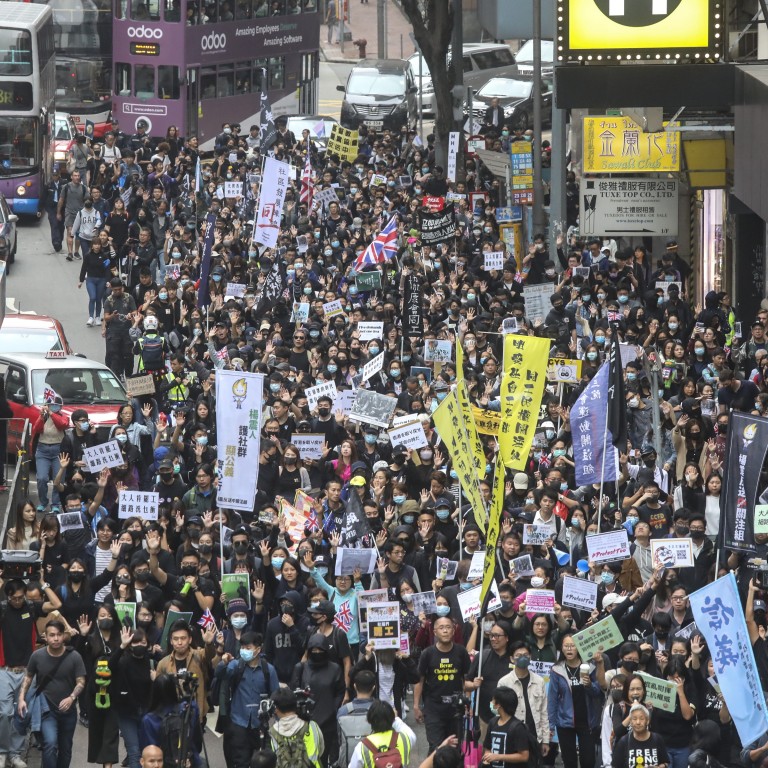
Social workers take to Hong Kong streets to urge international community to join fight against city’s ‘humanitarian crisis’
- Social Welfare Sector Strike Committee leads march to Canadian, Japanese and European Union offices
- Hundreds urge countries to pass laws similar to US’s Hong Kong Human Rights and Democracy Act
Hundreds of people joined a peaceful march and rally organised by a group of social welfare workers to call for international intervention in Hong Kong’s “humanitarian crisis” on Thursday.
The same group, Social Welfare Sector Strike Committee, was behind a three-day strike in the sector that began on Tuesday in support of the ongoing anti-government protests.
Speaking before the march set off at 2.30pm, committee member and social worker Doris Leung called on more countries to make laws over the human rights situation in Hong Kong.
“We hope leaders of various countries can pass … acts so to sanction Chinese and Hong Kong officials that erode human rights in Hong Kong,” Leung said.

The act also allows Washington to suspend Hong Kong’s special trading status based on an annual certification by the department about whether the city retains a sufficient degree of autonomy under the “one country, two systems” framework.
Marchers submitted petition letters at eight consulates, including that of Canada, Japan and the US, as well as the European Union’s office in the city.
The march spilled out onto roads and came to a halt at around 3.30pm after reaching Justice Drive.
Riot police asked the crowd to return to the pavement to continue their march but some protesters did not budge.
After a mild confrontation lasting about an hour, the remaining crowd was allowed to continue walking along the road.

The committee said more than 1,000 people attended the Thursday afternoon march, which was followed by a rally at Edinburgh Place, Central the same night, which organisers said was attended by about 1,500.
At the rally, the committee said more than 2,000 social welfare workers from some 40 organisations were involved in the three-day strike.
“If the adults are willing to go on strike, the young would not need to clash with police,” the crowd chanted on their way from Wan Chai to Central.
More than 6,000 people have been arrested since the protests over the now-withdrawn extradition bill began in early June. About 40 per cent of them are students.
A social worker in his 40s, who called himself KK, had been on strike for three days.
“Most social workers are peaceful, rational and non-violent, if we are united, we can do more [for the protest movement],” he said.
He believed the three-day strike was effective in enhancing unity within the sector for future industrial actions.
“The number of people on strike [this time] does not need to be huge, it is only the start,” he said.
Donald Trump signs Hong Kong Human Rights and Democracy Act into law
A 37-year-old social worker who worked with young people, and spoke on condition of anonymity, said she believed striking was a peaceful and effective way to put pressure on the government in responding to protesters’ demands.
“Although there isn’t an economic impact, we want to tell Hongkongers that we do not want the young people to [take radical actions] on behalf of us,” she said.
She said clashing with police would not bring long-term change to society, and added: “We should take aim at the government.”
The Social Welfare Department said only a small number of government-subsidised services were affected by the strike.
“The service units concerned have made contingency arrangements by, for instance, rearranging activities to other date, and have informed their service clients concerned,” the department said.
Separately, Democratic Party lawmaker Ted Hui Chi-fung has kick-started a HK$3.3 million crowdfunding campaign to launch legal actions against alleged police brutality.
Those involved hope to launch private prosecutions against the police officer who shot a student in the chest in Tsuen Wan on October 1, and another who drove into a crowd of protesters in Kwai Fong on November 11.
They also plan to apply for a civil injunction to stop the force from using mainland-made tear gas canisters.

